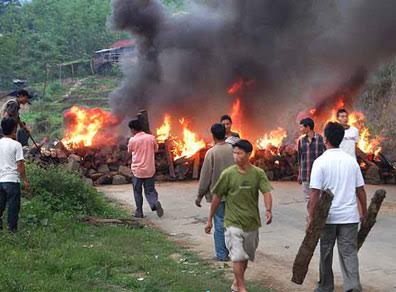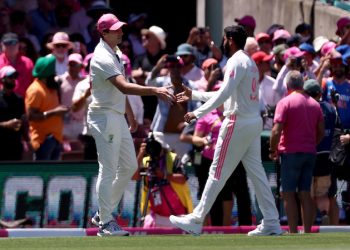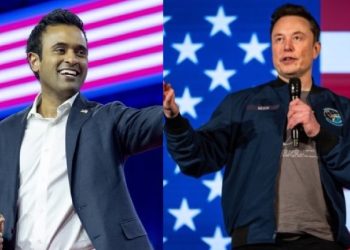India in the world
• A new investigation shows that the Modi government reportedly widely distributed fortified rice before fully understanding its impact on human health. This reportedly provided a Dutch company with significant profits. Despite concerns raised by the finance ministry dismissing the project as “premature”, the government proceeded with its plan.
• According to government and industry sources, India intends to submit a formal complaint to the World Trade Organisation (WTO) concerning the European Union’s proposal to impose tariffs ranging from 20% to 35% on imports of high-carbon goods, such as steel, iron ore, and cement from India. With this, New Delhi aims to combat the European Union’s Carbon Border Adjustment Mechanism (CBAM).
• On May 15, Fernand de Varennes, the UN’s special rapporteur on minority issues, issued a statement saying the G20 was “unwittingly providing a veneer of support to a facade of normalcy” whilst human rights violations are ongoing in Kashmir. China and Saudi Arabia boycotted a G20 meeting held in Kashmir. Civil society actors also called for a boycott, citing human rights concerns.
• On May 16, the European Union’s foreign and security policy chief, Josep Borrell, called on the EU to crack down on India for reselling fuels produced with Russian oil.
• From May 19-21, Prime Minister Modi attended the G7 Summit in Japan to reportedly represent “the voice of the global south”. Important agenda points included the impacts of Russia’s war on Ukraine, but India chose not to explicitly condemn the invasion.
• On May 22, a 19-year-old Indian-origin man crashed a truck into security barriers near the White House in the United States. The driver told the authorities he would kill the president and expressed personal admiration for Hitler. He was detained and convicted afterward.
• On May 24, human rights groups, including Amnesty International, organised a screening of the BBC documentary, ‘India: The Modi Question’ at the Australian Parliament House in Canberra during PM Modi’s Australia visit. The documentary, which was released in January this year, examines responsibility for riots in Gujarat, India in 2002, in which at least 1044 people died, and reports partial responsibility of India’s current Prime Minister Modi.
• On May 25, the European Commission’s Climate Policy Chief, Frans Timmermans, began his two-day visit to India. Frans Timmermans engaged in discussions with government officials, stakeholders, and civil society regarding the upcoming COP28 UN Climate Change conference.
• On May 25, EU Special Representative Eamon Gilmore met with HRD Avinash Kumar to discuss mounting human rights challenges in India, including the situation of minorities.
• Global labor unions condemned the Indian government’s decision to disrupt the participation of independent unions at the G20. The Indian government has insisted on the Bharatiya Mazdoor Sangh (BMS), affiliated with Prime Minister Modi’s ruling party and known for its Hindu nationalist stance, chairing the Labour 20 working group.
• The United States urged India to condemn religious violence one month ahead of Prime Minister Narendra Modi’s visit. The US has expressed concerns about incidents of violence against religious minorities in India.
• India is shifting its focus from being a major arms importer, to becoming a defense manufacturing hub and export leader. Prime Minister Narendra Modi has announced plans for India to become the world’s largest defense manufacturing base. The government aims to increase defense exports by $5 billion over the next two years. India’s defense exports have reached a record high of approximately $1.95 billion for the fiscal year 2021-2022, marking an increase of more than 10 times in six years and sales to over 70 countries.
• For the second time, the re-accreditation of the National Human Rights Commission (NHRC) of India has been postponed by a UN-affiliated agency for a year. The re-accreditation process occurs once every five years. Without this accreditation, the NHRC will be unable to represent India at the United Nations Human Rights Council.
Communal Violence and Riots
Violent clashes on May 4 erupted between tribals and non-tribals in multiple locations across the northeastern state of Manipur:
• These clashes come after a longstanding ethnic conflict between the Meitei (mostly Hindu) and the Kuki (mostly Christian) over special protections under the constitution. There have also been concerns about a rise of Meitei nationalism, and an increase in militant groups, coinciding with the BJP assuming power in Manipur in 2017. The Manipur High Court on 20 April directed the Manipur government to consider the request of the Meitei community to include them in the Scheduled Tribe category.
• In response, the state government imposed a curfew, shut down internet services, and issued “shoot-on-sight” orders on May 4 to enforce the curfew. The Indian Army deployed an estimated 10,000 troops and paramilitary forces.
• It is reported that more than 80 people have been killed and at least 35 000 have been displaced (according to the Chief Minister) in this violence. At least 250 churches have been reportedly burned. Within the first four days, at least 1700 homes were destroyed.
• The United Nations High Commissioner for Human Rights Volker Türk said in a statement that the violence in Manipur “revealed the underlying tensions between different ethnic and indigenous groups”. He urged the authorities to “respond to the situation quickly, including by investigating and addressing root causes of the violence in line with their international human rights obligations”.
On May 5, the controversial movie “The Kerala Story” was released in theatres:
• The film allegedly depicts the conversion of women from Kerala to Islam and their recruitment by the Islamic State. Initially, the filmmakers asserted that 32,000 women from Kerala had been converted to join the Islamic State. However, when pressed for evidence, they modified the trailer, now stating that the movie is a “compilation of the true stories of three young girls”.
• Prime Minister Narendra Modi argued that the film revealed a “terror conspiracy” and shed light on the “ugly truth of terrorism”.
• Movie screenings of “The Kerala Story” have been used by the Hindu supremacist Vishwa Hindu Parishad (VHP) to recruit people, such as in this video which records VHP getting the audience to make an oath to take action.
• On May 8, the West Bengal government banned the screening of the movie. On May 18, the Supreme Court issued a stay order on the West Bengal government’s ban, after the Kerala government approached the Supreme Court challenging the ban. Two state governments, Uttar Pradesh and Madhya Pradesh, have made the film tax-free.
• On May 13, a heated argument on social media regarding the film escalated into violent clashes in Akola, Maharashtra. One group threw stones and caused damage to properties and vehicles. The violence resulted in the death of a 40-year-old man and left eight others severely injured. The local police responded by arresting around 147 individuals, implementing curfews, and suspending Internet services.
Human Rights Defenders and Civil Society
• In May, a new report published by the Business & Human Rights Resource Centre documented that India, Brazil, and Mexico had the highest number of attacks against human rights defenders. Next to the United Arab Emirates, India also had the highest number of attacks related to companies, such as JSW Steel, a prominent Indian steel and coal manufacturer.
• On May 3, independent journalist Sakshi Joshi was assaulted by police. According to Joshi, she was trying to capture footage of the police deployment at a protest organized by women wrestlers against alleged sexual harassment. Joshi was detained for approximately an hour and released without any charges.
• On May 3, India dropped to rank 161/180 in the Press Freedom Index published by Reporters without Borders (RIF). Between 2010-2020, 154 journalists were arrested, detained, interrogated, or harassed for their work in India.
• On May 6, 75-year-old human rights activist and lawyer, Mohammad Shoaib, renowned for taking up the cases of individuals falsely accused of terrorism, has allegedly been arrested by the anti-terror squad of Uttar Pradesh police.
• Teesta Setalvad, journalist and HRD, was awarded the PEN international ‘Empty Chair’ award at the 55th International Writers for Peace Committee Meeting in Bled, Slovenia.
• On May 12, sixteen human rights organizations issued a joint appeal to the Indian authorities, urging them to immediately cease the retaliatory actions taken against human rights defenders and organizations in Jammu and Kashmir, particularly targeting individuals such as Khurram Parvez, Irfan Mehraj, and the Jammu and Kashmir Coalition of Civil Society (JKCCS). Khurram Parvez has been subjected to arbitrary detention since 22nd November 2021 as a punitive measure for his dedicated human rights activities, which involve documenting and advocating for the rights situation in Jammu and Kashmir.
• After the BBC documentary ban and the office raid, the BBC has now been summoned by the court in a defamation case on 22 May.
Hate Crimes against Minorities
• On May 4, a 24-year-old Dalit groom and others were allegedly physically assaulted during a wedding procession. A group of 20-25 reportedly upper caste individuals, reportedly attacked the groom armed with sticks and iron rods. The groom’s mother-in-law reported that Dalit women who intervened were molested.
• On May 17, a Delhi-based cow vigilante group reportedly stormed a slaughterhouse and assaulted two Muslim men. Cow vigilante groups have been accused of increasingly cracking down on cow slaughter through violence, often resulting in assaults and lynchings of Muslims. Several similar incidents took place across May.
• On May 19, a man from Rajasthan was allegedly beaten to death by his wife’s family due to their interfaith marriage. Three members of the wife’s family have been arrested and sent to judicial custody.
• On May 25, a Muslim man was reportedly beaten by a mob in Muzaffarnagar, Uttar Pradesh, who stopped him on the pretext of asking for directions. Locals claim he was targeted because of his faith.
• During May, there were three separate instances of events where speakers delivered anti-muslim speeches in Maharashtra alone. One of these events was attended by Shrikant Shinde, a Member of Parliament from the Shiv Sena party and the son of Chief Minister Eknath Shinde. During two of the rallies, it was noted that at least one speaker made references to weapons.
• Bharatiya Janata Party (BJP) leader in Uttarakhand, Yashpal Benam, has decided to stop his Hindu daughter’s marriage to a Muslim man due to “current circumstances”. Following the circulation of the wedding invitation online, groups associated with the Hindu supremacist Vishwa Hindu Parishad and the Bajrang Dal organized a protest against the inter-faith marriage.
• During May, several Hindu supremacist groups reportedly organised weapons training, such as the Durga for minor girls in Madhya Pradesh.
• The Rashtriya Bajrang Dal, a group led by Hindu supremacist Pravin Tagodia, reportedly organised a training camp for youth in Ahmedabad, in which firearms training was held. In several places, the Hindu supremacist Bajrang Dal (“God Hanuman’s army”) reportedly held camps in which they also practiced using firearms. This came after the Bajrang Dal and other Hindu supremacist groups are increasingly holding street marches with weapons.
• On television, recorded in Sitapur, Uttar Pradesh, Bajrang Muni called on Hindus to pick up weapons. Bajrang Muni is a Hindu religious leader who is known for having threatened to rape Muslim girls in retaliation for harassment of Hindu girls. Similarly, television personality Suresh Chavhanke, whose hate speech is extensively documented in this report by The London Story, again called for Hindus to keep swords ready. Similar incidents took place across May.
• The province president of the Hindu supremacist Vishwa Hindu Parishad, Kapil Khanna, threatened that Rohingya refugees will not be allowed to live in Delhi. India continues to deport Rohingya to Myanmar. Amit Shah has a consistently hostile approach to refugees, as is visible when he referred to Rohingya as being “termites” in 2019.
• In Nawagarh, Chattisgarh, Hindu supremacist groups reportedly organized a mass rally against the opening of a church in the village.
• Hindu supremacist leader Sadhvi Prachi engaged in hate speech against Muslims at a movie screening of the Kerala Story, and was subsequently charged with “delivering provocative speech”.
Demolitions and Evictions
• At least 1,600 homes have been forcibly demolished in India’s capital over three months, which has left approximately 260,000 people homeless. Demolition squads frequently served notices as they carried out the four destructions. Additionally, Delhi demolished homeless shelters. This is in the context of a “beautification” plan for Delhi, as it prepares for G20 summit meetings scheduled on 9 and 10 September. These incidents follow a surge in demolitions that violate due process across India, colloquially called “bulldozer raj”, including in Kashmir, Delhi, and across the country. In June 2022, three United Nations Special Rapporteurs condemned the demolitions across India, which they allege deliberately target Muslims through “collective punishment”.
Executive
• On May 3, an order from the Manipur Human Rights Commission (MHRC) revealed that Myanmar refugees had been detained in Manipur’s state jails for longer than the prescribed detention period. The MHRC has instructed their release and urged the state government to address the issue with the Union Home Minister for their immediate deportation to Myanmar.
• On May 10, Indian Prime Minister Narendra Modi’s party, the Bharatiya Janata Party (BJP), lost the elections in the state of Karnataka, a key stronghold for the BJP. The defeat is seen as a significant setback for Modi and raises questions about his ability to secure a third term as prime minister in the upcoming national elections in 2024.
• On May 15, police raided a house where Christian community members were holding a prayer in Shahdol, Madhya Pradesh. Latest reports suggest police have confiscated their religious books and launched an investigation into allegations of religious conversions.
• On May 16, the Chief Minister of Assam announced that 300 more madrassas (Muslim religious schools) will be closed, which may be in violation of the freedom of religion enshrined in India’s constitution.
• On May 20, the Central Government issued an ordinance to strip Delhi’s power to control bureaucracy. This violates a ruling from the Supreme Court given on May 11. The constitution bench determined that the legislature has authority over bureaucrats in the administration of services, except in areas that fall outside the legislative powers of the National Capital Territory (NCT). The three areas outside the control of the Delhi government are public order, police, and land.
• On May 23, the Academic Council (AC) of Delhi University approved several modifications to the syllabi, one of which involved the removal of a Muslim poet from the BA political science syllabus. This revisionism comes against a larger trend. In 2022, the National Council of Educational Research and Training (NCERT) of India conducted a textbook “rationalisation” exercise. In this, it reportedly deleted several passages and even entire chapters that concern controversial historical events, and education on democracy. For instance, the entire chapter “Key Elements of a Democratic Government” was omitted in one textbook. India also cut out periodic tables and evolutionary theories from textbooks last month. Both will not be taught anymore to under 16-year-olds.
• On May 25, Prime Minister Modi inaugurated the new Parliament building in Delhi amidst major criticism. Earlier this week, 20 opposition parties decided to boycott the inauguration of the new Parliament building, demanding that President Draupadi Murmu, rather than PM Modi, conduct the ceremony.
• On May 28, several prominent female wrestlers and supporters were violently detained by the police. This incident unfolded as a culmination of the ongoing protests against the president of the Wrestling Federation of India (WFI), Brij Bhushan Sharan Singh, whom they accuse of sexual harassment. It was reported that officers “forcefully dragged and detained” the protesters.
• An article published on May 29 shows that according to the All India Survey on Higher Education (AISHE) 2020-21 carried out by the Ministry of Education, while the enrolment rates of Scheduled Castes (SCs), Scheduled Tribes (STs), and Other Backward Classes (OBCs) in higher education witnessed improvements, there was a decline by 8% in the enrolment of the Muslim community. This is reported to be partially influenced by the COVID-19 pandemic, highlighting the economic challenges faced by the community, because many students are compelled to seek employment after completing school rather than pursuing higher education.
Judiciary
• On May 24, a Delhi court sentenced Kashmiri separatist leader and the chief of the banned Jammu & Kashmir Liberation Front (JKLF), Yasin Malik, to life imprisonment in a case related to terror funding. The National Investigative Agency (NIA) had previously sought the death penalty for Malik after he pleaded guilty to charges connected to terror funding, spreading terrorism, and engaging in secessionist activities in Kashmir back in 2017.
Media and Technology
• On the recommendation of the Ministry of Home Affairs, the Indian government has to blocked 14 mobile applications, including the secure messaging app Threema. Central intelligence agencies claimed they were being used by terrorists and their supporters in Jammu and Kashmir.
Compilation by The London Story.











